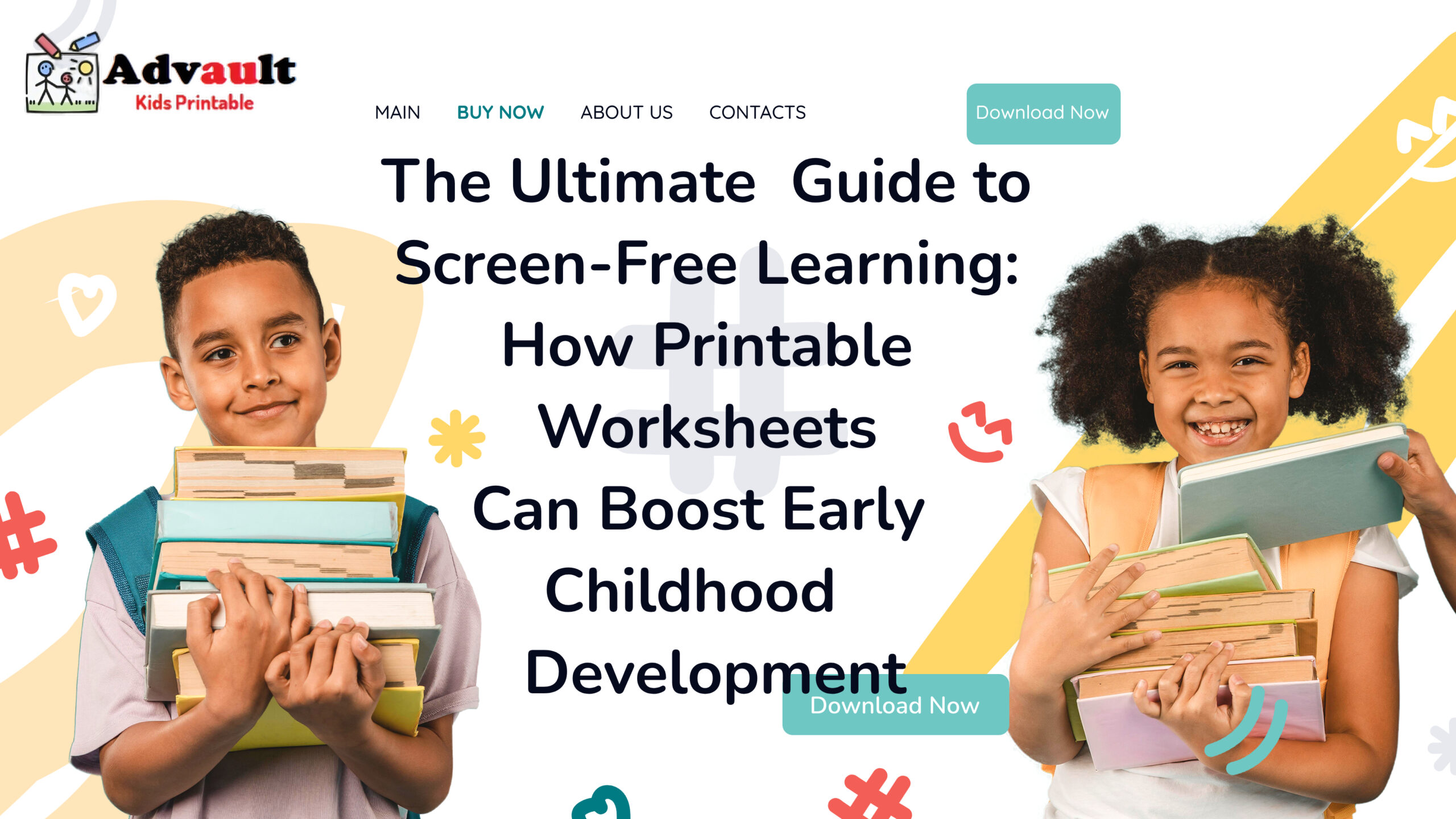
Introduction: Why Screen-Free Learning Matters
In today’s tech-driven world, young children often spend significant time on digital devices, sparking concerns among parents and educators about the impact on their health and development. Excessive screen time has been linked to challenges like reduced focus, delayed social skills, and even disrupted sleep. Printable worksheets present an excellent alternative, providing a screen-free, hands-on approach to learning that fosters essential developmental skills. By balancing screen time with enriching, tactile activities, worksheets support cognitive, motor, and emotional growth in a way that captivates young minds.
The Downsides of Excessive Screen Time for Kids
While technology offers many educational tools, an over-reliance on screens can hinder crucial developmental milestones. Research suggests several ways in which excessive screen time can impact children negatively:
- Shortened Attention Span: Constant stimulation from screens may make it harder for kids to focus on single tasks, especially non-digital ones.
- Sleep Disruptions: Bright screens, especially before bedtime, can interfere with natural sleep patterns, leading to fatigue and difficulty focusing the next day.
- Social Skill Deficits: Time on screens often replaces time spent interacting with others, impacting kids’ abilities to read social cues and develop empathy.
- Delayed Fine Motor Skills: Activities requiring precise movements, such as writing or using scissors, are limited when children are primarily interacting with screens.
- Emotional Regulation Challenges: Children may struggle to manage their emotions, as passive screen consumption reduces opportunities for real-world experiences that foster resilience and self-discipline.
In contrast, screen-free activities such as printable worksheets provide immersive experiences that require children to use their hands and minds in real-time, helping counterbalance the effects of screen overuse.
Printable Worksheets: An Engaging Alternative
Printable worksheets offer structured, screen-free activities that engage children in subjects like math, reading, and fine motor practice. This approach combines educational content with tactile experiences, helping kids retain information through physical involvement. Some benefits of using printable worksheets include:
- Hands-On Learning: Kids interact directly with materials, using pencils, crayons, or other tools, making learning more concrete.
- Skill Building: Worksheets allow focused practice on specific skills, whether tracing letters, identifying shapes, or solving puzzles.
- Flexibility and Variety: From coloring pages for toddlers to more advanced math and reading worksheets for older children, printable resources provide diverse learning opportunities tailored to each age group.
- Increased Engagement: When children see their progress, they feel a sense of accomplishment and are more motivated to continue learning.
With activities ranging from creative drawing to problem-solving puzzles, worksheets make learning an enjoyable and rewarding process for children.
Key Areas of Development Supported by Printable Worksheets
1. Cognitive Development
- Activities: Matching, sorting, and sequencing exercises sharpen logical thinking and pattern recognition, both of which are essential for early math and reasoning skills.
- Benefits: By encouraging children to follow steps and solve problems, these activities lay the groundwork for complex thinking.
2. Motor Skills
- Activities: Tasks like coloring, tracing, and cutting enhance fine motor control, which is vital for writing and other precise tasks.
- Benefits: Building hand strength and coordination not only prepares children for writing but also boosts overall dexterity.
3. Language Development
- Activities: Vocabulary building, phonics, and simple sentence creation exercises improve foundational language and literacy skills.
- Benefits: These worksheets foster reading readiness, enabling children to connect sounds with letters and understand language structure.
4. Social-Emotional Learning
- Activities: Activities designed to be completed alone or with guidance teach patience, perseverance, and self-discipline.
- Benefits: Working on worksheets can boost confidence as children develop self-regulation and enjoy the satisfaction of completing tasks.
Each of these developmental areas plays a vital role in early childhood growth, and printable worksheets offer a comprehensive approach to nurturing these skills in a non-digital, engaging way.
How to Choose the Right Worksheets for Each Age Group
Selecting age-appropriate worksheets ensures children are challenged yet not frustrated. Here’s a guide for choosing worksheets tailored to each developmental stage:
- Ages 2-3: Simple activities like coloring, matching, and basic tracing. These activities introduce young learners to foundational skills like color recognition and shape identification.
- Ages 4-5: As children’s skills grow, introduce worksheets that involve counting, letter tracing, and shape recognition. These exercises build on earlier learning and introduce basic math and literacy concepts.
- Ages 6-7: Worksheets at this stage should encourage sentence-building, problem-solving, and beginner math tasks, laying a foundation for academic skills needed in early elementary grades.
Matching worksheets to developmental stages ensures kids are working on skills that promote growth while keeping them engaged.
Success Stories: Real Parents Share Experiences
Many parents who have integrated printable worksheets into their children’s routines report impressive results. Here are a few testimonials:
- Improved Focus: “Since starting with screen-free worksheets, my child has become much more focused during learning time. It’s amazing to see them complete activities without the usual distractions.”
- Enhanced Motor Skills: Another parent shared, “The tracing and coloring worksheets have really helped my child’s handwriting and hand-eye coordination. It’s a fun way to practice!”
- Confidence in Learning: “Our child now looks forward to their learning time and loves to show us their progress. The worksheets have made a huge difference in their eagerness to learn.”
Such stories illustrate the transformative impact screen-free learning can have on children’s confidence, focus, and skills.
Conclusion: Embrace Screen-Free Learning
Ready to support your child’s development with meaningful, screen-free activities? Printable worksheets are an effective, affordable way to cultivate skills that set kids up for success. With our extensive bundle of over 14,000 worksheets, you’ll find activities for every age and skill level, allowing your child to explore, learn, and grow—without the drawbacks of screen time. Embrace the world of hands-on learning and give your child the tools they need to thrive!
